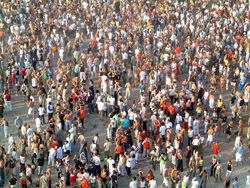
August 12, 2011
Demographers are statistically minded folk who count people and project population numbers. A cheery lot, they ignore politics, wars, shortages, and environmental issues. They track birth and death rates, life spans, ages, fertility rates, education, income levels, health advances, and where people live (urban or rural); then fearlessly project the future population as a demographic transition, playing out the trends.
Demographers don’t see sudden tipping points. Most of the people that will be alive in 2031, for instance, are here now, available to be counted. Projecting that the global population will hit 7 billion in October 2011 is like predicting that it will rain again. But news media made a big deal out of tweaks to the model suggesting that population growth might surge a tad and top out above 10 billion by 2100.
Demographic models use different assumptions for demographic transitions, projecting how they will affect the migration of the present demographic profile. Historically, demographer’s global projections have been pretty accurate without assuming drastic changes. For example, genocides had horrific local effects, but little effect on most of humanity that kept going to work every day. China’s one-child policy has had a big impact, but it came on slowly and predictably.
Age and education demographic profiles are the most interesting output from these projections. You can see the age pyramid profile changes between now and 2050 “live” for every country on earth at: www.scim.ag/phYT60. Similar pyramids for all the states in India are at: www.scim.ag/o9gSxu.
Viewing these profiles ought to be mandatory for political and organizational leaders, and maybe anyone who votes. Even with tame assumptions, our future will be very unlike our past, and the profiles imply how. Industrial societies have been very successful extending life spans and reducing birth rates, so that many now have a nearly flat age demographic profile.
However, most of our social and economic systems have assumed a relatively steep age pyramid: hordes of young at the bottom; a few old at the top. If that is not true, then we should make major systemic shifts in education, retirement, health care, savings plans, and much else. With Compression Thinking this should be a healthy challenge rather than a traumatic one. We have to rethink what social responsibility is, what work is, and what each person is entitled to just by being a member of society. And we can determine how 10 billion can live here without most being in misery. However, if done by people unaware of so much as demographic profile projections, such debates are unlikely to be as tame as demographic assumptions.
